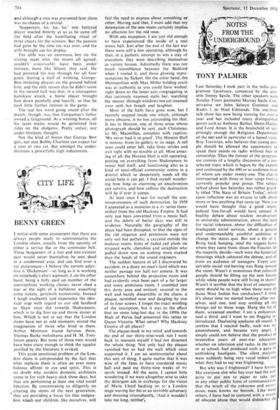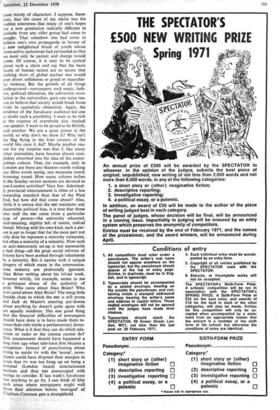TONY PALMER
Last Saturday I took part in the radio pro- gramme Speakeasy, compered by the ami- able Jimmy Savile. The other speakers were Sunday Times journalist Murray Sayle, Con- servative !AP John Selwyn Gummer and Radio I DJ Noel Edmunds. The one-hour talk-show has now being running for over a year and has included many distinguished guests such as Anthony Barber, Denis Healey and Lord Arran. It is the brainchild of sur- prisingly enough the Religious Department of the sec and in particular of a lapsed vicar, Roy Trevivian, who believes that young peo- ple should be allowed the opportunity to speak their minds on radio without fear of censorship. Thus the format of the program- me consists of a lengthy discussion of a pre- selected topic which is begun by the experts and continued by the 400 or so audience most of whom are under twenty-one. The chat is interspersed with three or four songs from a currently popular pop group. The subject talked about last Saturday was rather grand- ly titled 'The State of Britain Today', which upon reflection was an excuse to talk about more or less anything that came up. Now you would have thought that a good unpre- judiced free-for-all would have ensued. A healthy debate about student involvement in university administration. about the need for racial tolerance, about the difficulties of inadequate social services, about a general and understandable youthful ambition to change the status quo. But not a bit of it. Bring back hanging, send the niggers home where they came from, shoot the Fascists, let the majority decide—such were the hysterical shoutings which coloured the debate, and all from an audience of teenagers. Every con- ceivable social red-herring was flung around the room. Wasn't it monstrous that coloured people should be filling up the new houses while white people were still living in slums? Wasn't it terrible that the level of unemploy- ment should be so high when there were all those West Indian bus conductors? I think it's about time we started looking after our- selves, said one, and stop sending all this foreign aid to those wogs. Hang the lot of them, screamed another. I am a policeman, said a third, and I want to see flogging re- introduced. Deafening applause all round. confess that I reacted badly, such was my astonishment, and became very angry. I simply could not believe that the product of twentyfive years of post-war education. whether on television and radio, in the press or at school, had produced such a gang of unthinking hooligans. The silent _maioritY were suddenly being very vocal indeed and what they had to say was frightening.
But why was i frightened? I have known. like everyone else who has ever had the aud- acity to put pen to piper or take part in any other public form of communication, that the wrath of the unknown and anonr mous mass knows no bounds. Like many others, I have had to contend with a stream of obscene abuse that would dishearten the most sturdy of characters. I suppose, there- fore, that the cause of my alarm was the sudden awareness that many of one's hopes for a new generation radically different in attitude from any older group had come to nought. That somehow one had come to believe one's own propaganda in favour of a new enlightened breed of youth whose more active spokesmen had persuaded us that we need only be patient and change would come. Of course, it is easy to be cynical about such a claim and say that the basic facets of human nature are so secure that nothing short of global nuclear war would ever divert selfishness or greed or masochis- tic violence. But the growth of all things underground—newspapers, rock music, fash- ion, political liberation, the subversive revo- lution in the universities, gave one some rea- son to believe that society would break loose from its capitalistic obsessions. Again, the evidence of the Speakeasy audience led one to doubt such a possibility. I want to be rich at the expense of everybody else, implied one speaker. I want to be proud to be British, said another. We are a great power in the world, so why don't we show it? Why isn't the flag flying in the four corners of the world like once it did? Maybe another rea- son for my surprise was that I, like many other journalists, have become almost corn- plelety absorbed into the idea of the metro- politan culture. That, for example, only in London are there any theatres worth visiting any films worth seeing, any museums worth browsing round. How many column inches in the Sunday review sections are devoted to non-London activities? Very few. Admitted- ly provincial entertainment is often of a less rewarding standard than that of the West End, but how did that come about? Also, while it is untrue that the BBC maintains any discernible political bias, it is true that those who staff the BBC come from a particular type of person—the university educated, well-meaning, slightly left of centre, radical liberal. Mixing with his own kind, such a per- son is apt to forget that for the most part not only does he represent a minority viewpoint, but often a minority of a minority. Now such an anti-democratic set-up is not necessarily a bad thing—all the great social reforms of history have been pushed through relentlessly by a minority. But it carries with it unique dangers of which many in the communica- tions industry are profoundly ignorant. Alan Brien writing about his trivial week, however wittily, for example, seems to me a grotesque abuse of the authority of print. Who cares about Alan Brien? Who ever cared about Alan Brien? The smug little fireside chats to which the BBC is still prone and Jack de Manio's sneering put-downs about anything he doesn't quite agree with are equally insidious. The one good thing that the financial difficulties of newspapers should have done is to have made them re- assess their role inside a parliamentary demo- cracy. What is it that they can do which tele- vision or radio or the cinema cannot do? This reassessment should have happened a long time ago when television first became a competitor. Instead of pussyfooting about trying to outdo Tv with the 'scoop', news- papers could have diverted their energies to areas that TV was too hung up on being a national (London based) entertainment medium and thus too preoccupied with ratings to consider. If last week's Speakeasy was anything to go by, I can think of fifty such areas where newspapers might well focus their attention before 'outraged' of Clapham Common gets a stranglehold.











































 Previous page
Previous page